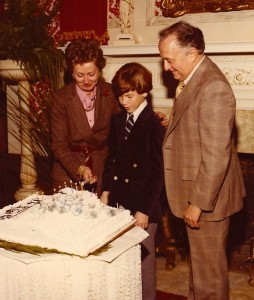I never thought of myself as liverwurst before, but it does connect and bind the two pieces of bread into a sandwich. Or maybe vegemite. Peanut butter is an aspirational concept.
I am a member of the sandwich generation. The child that needs to provide for her parent(s) and her child(ren). I, and so many like me, are the spread between the pieces of bread. We keep it all together.
Last week, Dad called, saying he was locked in his art studio and that he needed me to call the police. He had his coat on and was cold. I told him I would call him right back on his home line and if he answered that meant he was really at home and just momentarily confused. He agreed. But he didn’t actually hang up the phone so I couldn’t get through. I called the home health aide and we agreed that I should come over and calm everything down. We are only called in when the episodes lasts long enough to be totally freaky.
I came over, and Dad agreed to take off his coat, since I was doing the same. Now, how to convince a scared man that he is really in his home?
“Dad, if this were your home, would you know where you keep the scotch?”
“Of course,” he said as if I had impugned his very core. [Ok, I guess that is good.]
Dad went right for it. Score 1 for the older generation.
“Dad, if this were your home, where would your underwear drawer be?”
Dad found that, too. Score 2. While we were standing in front of his bureau, I asked:
“Dad, do you recognize some of the people in the pictures?”
He did. Not all but most. Score 2.5.
“So, Dad, if this is not your home, then it is doing a good job of making you comfortable.”
“But you see all of the paintings . . . ” He was referring to the paintings and sculpture in the living room and dining room.
A-ha. He doesn’t recognize that those are his and Mom’s. This is a huge downward trajectory for Dad. “Daddy, those are your and Mom’s paintings and sculptures.”
He seemed to start to understand. But not yet.
“Dad, if this is not your home, then this is a great art studio. I am going to have some wine while you have dinner in your dining room. Join me?”
Dad ate a little and had a little wine (less alcohol than scotch). We talked. Mostly non-sense (as in I had no idea what he was talking about) but slowly he was calming down and returning to earth. Finally he said:
“It is good to be home. And so lovely to have you over for dinner.”
“Yes, Dad, it is a treat to see you midweek. Now I am going home.”
We kissed good night. I hugged his home health aide knowing that she allows me to have a life separate from Dad’s because she only calls in the cavalry when she cannot snap him out of it within a reasonable time and he is a flight risk.
I get home and hug and kiss my son. We talk about the day and the weekend ahead, during which we will all attend a Bat Mitzvah.
“E-mom, remember, don’t hang around me during the Bat Mitzvah. It will be embarrassing.”
“No problem, buddy.” What I wanted to say was, “I don’t want to watch you and tweenage friends behaving in a way that will make me skin crawl. Besides, I am going to hang with the adults and behave in a way that will make you cringe from afar.”
But instead, I took my victory from the top bread and didn’t squeeze too hard on the bottom bread.
Maybe we could be a panini.







